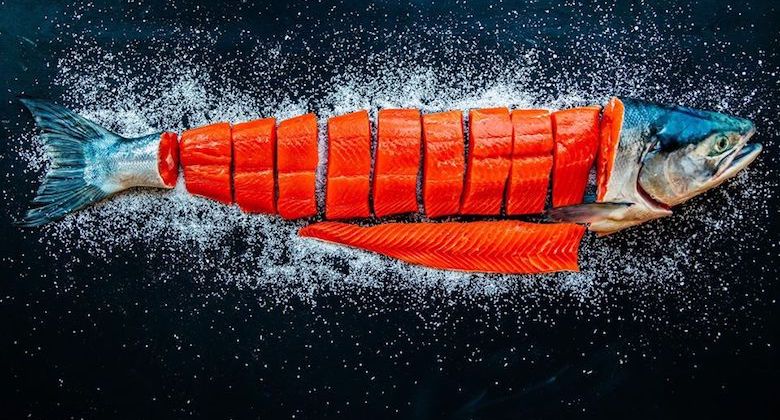
Lovers of sockeye salmon—the nutritional powerhouse with that incomparably brilliant red-orange flesh—might be distressed to hear that half of the world’s supply is in jeopardy. The reason? A recent decision by the Environmental Protection Agency to withdraw its objection to a mine proposed for the Bristol Bay region of Alaska.
Bristol Bay, in addition to being a place of extraordinary natural beauty, is the world’s largest producer of wild sockeye salmon. It is a bucket-list destination for any sport fisherman, but more importantly, native Alaskans have subsisted on the salmon and trout there for millennia; fishing those waters is still their primary source of income today. Bristol Bay sockeye supports a commercial fishing-based economy valued at over $1.5 billion per year, and is responsible for more than 14,000 American jobs.
Unfortunately for the salmon and the people who fish for them, one of the world’s largest untapped deposits of gold, copper and molybdenum happens to sit just upstream from the waters of Bristol Bay, and a Canadian mining company has been trying to access the strike for over a decade. Northern Dynasty’s plans for Pebble Mine envision a massive open pit mine; experts say that disturbing the minerals and sulfurous rock they are embedded in would almost certainly introduce environmental pollutants lethal to the salmon population.
“Alaska as a whole is a pretty pro-resource-development,” Dan Cheyette, in-house counsel at Bristol Bay Native Corporation, which manages its Native shareholders’ commercial interests, told me by phone from Anchorage. “There’s rarely a development project that Alaska doesn’t like, and what’s interesting about Pebble is, 60-something-percent of Alaska is against it.”
In 2014, the EPA used a little-known provision of the Clean Water Act to bar Northern Dynasty from even beginning the federal permitting process—and Northern Dynasty has been litigating the decision ever since. One May 12, new EPA chief Scott Pruitt announced that the agency had settled the lawsuit with Northern Dynasty, giving the Canadian miners the green light to proceed with the permitting process. By Northern Dynasty’s account, the Trump administration is said to be favorable towards the project.
Christopher Nicolson, a 5th generation fisherman who provides Alaskan sockeye to Blue Hill at Stone Barns, among several other New York area restaurants and retailers (list below), finds himself in a particularly dark humor these days. His family has been fishing Lake Iliamna, in the Bristol Bay watershed, for hundreds of years, and he and his fellow fisherman are consumed with fear about the future of the region.

“The salmon is so beautiful. The color is ridiculous, the texture is preposterous,” Nicolson told me. “They smell like the ocean and tomatoes and persimmon. They are magical. But it’s $300 billion of gold against a bunch of fish, and there’s never been any time in the history of fish versus gold when fish have won.”
Pebble Mine is a project that, by all logic, should have no shot. Sockeye salmon is one of the most nutritious foods on the planet, and the catastrophic impact to that and hundreds of other animal species should make the federal and state permitting process an impossibility. On top of that, due to the mine’s remote location and geological features of the strike, some say that accessing the minerals buried there would be prohibitively expensive. Northern Dynasty needs to find an investor to finance the permitting process; two former mining partners, Rio Tinto and Anglo America, abandoned the project after sinking hundreds of millions of dollars into exploration. But Cheyette points out that we live in strange and unpredictable times, and there is a feeling among Alaskans that anything could happen. “Anybody who makes a prediction about the outcome of this mine is just asking to be wrong,” Cheyette said.

How can sockeye lovers help join with Alaskans’ against Pebble Mine, aside from keeping the market for sockeye strong? “Contact your senators,” Cheyette said. “Make sure this is on their radar screen, even if floating in the back of their mind. Make sure the restaurants you go to know the threat, because the restaurant lobby is a powerful one.”
For his part, Nicolson hopes that providing the best-quality sockeye to New Yorkers will help keep the issue alive in the consciousness of chefs and change-makers.
“The whole history of my family is based on the purity of Bristol bay,” Nicolson said. “It’s how I feed my family, literally, so it’s critical for me that it’s protected. If Bristol Bay fails, my family fails.”
You can buy Christopher’s family’s sockeye salmon via Sea to Table, Park Slope Food Coop, Mermaid’s Garden and his family’s CSF called Iliamna Fish Company. Here’s more info about how to buy sustainable seafood in New York City.



